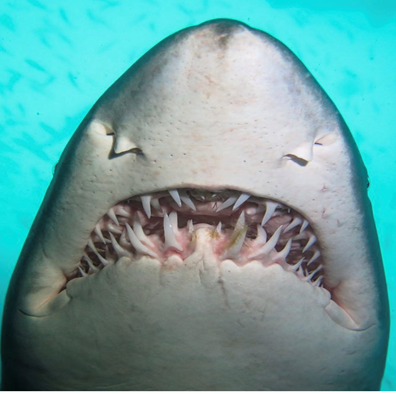Excuse me, you have something in your teeth – 2021 Perth Shark Conservation and Paula Black

Where are we in 2021 with shark conservation and who is Paula Black?
You might remember we recently shared a blog about a new dive site at Rottnest Island where the local, non-aggressive Grey Nurse Shark residents can be peacefully observed. We were put in touch with Paula Black who recorded the first sighting of a particular Grey Nurse Shark we too encountered. Paula’s story and shark conservation actions are impressive.
Paula is a big advocate for our oceans and sharks in particular. Having completed shark feeder training in the Bahamas and then to engage the public with the importance of sharks has worked with sharks in Mexico and other locations.

In Perth and South Australia Paula has helped through direct action. Literally attempting to repair the human impact by pulling fishing line from their jaws. Now we’re not suggesting anyone should try this at home, but we believe in Paula’s mission:
“While it’s difficult to know exactly how many sharks are killed annually by humans, a study published last year in the journal Marine Policy attempted to calculate the exploitation rates of sharks in order to assess this dire situation. Using data on shark catches, discards and mortality rates worldwide, the researchers estimated that approximately 100 million sharks are killed per year by humans. However, they add that this is a conservative estimate, and the true number could be as high as 273 million sharks killed annually by humans” @paula.black (Instagram)

But why do we need sharks?
Coral reefs have a delicate ecosystem balance. Algae grows on coral, which is eaten by herbivorous fish. Herbivorous fish are then eaten by larger predatory fish which are eaten by sharks. When sharks are in decline, less of the large predatory fish are eaten, which means that more of the herbivorous fish are eaten, and in turn, less of the algae is eaten. The algae compete directly with the coral, and too much algae kills coral reefs.
Another problem as a result of this imbalanced food chain noted in coral reefs, is that the excess growth of algae blooms would suffocate the ocean. Algae blooms suck the oxygen out of the water creating low oxygen levels. Without oxygen, marine life will suffocate to death.
Another major consequence if sharks disappear, is that many marine species would face extinction. This happens for two reasons. One, sharks often prey on the weak or ill members of marine life. The second reason marine species would face extinction is because when sharks are not around to consume other predators, those predator populations grow exponentially.
Paula strongly believes that ultimately if sharks die, so will our oceans.
Here in Western Australia, 2021 has seen the commercial fishing industry seek to reboot commercial shark fishing and throw out shark conservation by removing a ban that prevents commercial fishermen from keeping accidental shark catches known as “by-catch”.
The unfortunate side affect of allowing commercial fishers to keep sharks caught as “by-catch” being that any commercial fishing operation would effectively have permission to have caught sharks and profit from the catch. A dangerous financial incentive placing a bounty on the heads of sharks.
One of the justification points for this proposed change has been that commercial fishing has experienced an increase in the number of sharks they encounter, biting off part of their catches as they are being reeled in. While this may be anecdotally true, scientific evidence around the potential causes of this has yet to be seen.
It would be a tragic mistake to encourage further decimation of apex predators if the actual cause for their increased catches was not that there are too many, but something else like:
- a result of negative impacts on the marine environment or commercial fishing removing too many of their food sources
- or a natural predatory response. Food = fishing boats, struggling prey and blood in the water

Those of us who have experienced the awe of being in the presence of all kinds of these incredible creatures would like to see thorough, objective scientific studies that put the conservation of marine ecosystems as the first priority. Notwithstanding the obvious benefits of ecotourism, we all know we only have one planet. How many more ecosystems can we collapse? none we hope.
We were very pleased this week to read the announcement that WA would be abandoning shark drum line trials. Based on evidence, the drum lines had caught only two of the target species for tagging and had caught 266 other sharks and many non-target marine species.
For now, wildlife warriors like Paula and our own Bucket List Diver Clean up dive volunteers will continue the fight to protect the ecosystems we love through direct action. Interested in joining us for a clean up dive? email [email protected] to register your interest. Why not join us for an observation dive at Rottnest island to see our incredible Grey Nurse Sharks in action and understand why we need them.
A treat for making it this far, comic artist Anju Sabu has kindly allowed us to share the below clever creation in the hopes that you might join us on the shark side .

https://www.ohdakuwaqa.com
This and more creative shark works at @ohdakuwaqa on instagram
By Hayls Wight for Bucket List Diver
